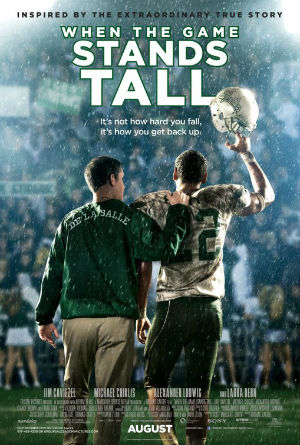
Baseball's Active Leaders, 2023
What Trump Said When About COVID
Recent Reviews
Everything Everywhere All at Once (2022)
Black Panther: Wakanda Forever (2022)
Doctor Strange in the Multiverse of Madness (2022)
Spider-Man: No Way Home (2021)
The Cagneys
A Midsummer Night's Dream (1935)
Something to Sing About (1937)
Angels with Dirty Faces (1938)
A Lion Is In the Streets (1953)
Man of a Thousand Faces (1957)
Never Steal Anything Small (1959)
Shake Hands With the Devil (1959)
When the Game Stands Tall (2014)
WARNING: SPOILERS
Winning is fun but relentless winning is hardly dramatic. There’s nothing to overcome. There’s no story there.
Neil Hayes’ book, “When the Game Stands Tall,” about the record-shattering 151-game win streak by De La Salle, a private Catholic high school football team in Concord, Cal., is mostly about its 2002 season; but Hayes includes an epilogue about the 2004 team that finally lost a game. (To Bellevue, by the way, at Qwest Field. Represent.)
| Written by | Scott Marshall Smith David Zelon |
| Directed by | Thomas Carter |
| Starring | Jim Caviezel Alexander Luswig Michael Chiklis Laura Dern Clancy Brown |
So that’s what this movie focuses on: losing, and how you recover from it.
There are some natural contradictions to mine here. Winning, for Coach Bob Ladouceur (Jim Caviezel), is a byproduct of playing the game right (humility, teamwork, etc.); but glory, humility’s opposite, is a byproduct of winning all the time. So how do you keep egos in check when you never lose? When does the byproduct of playing the game right cause you to play the game wrong?
Sadly, the movie dramatizes all of this with reductive situations and stock characters: the me-first, team-last dude who is cured like that by a trip to a VA hospital; the glory-seeking father in the stands (Clancy Brown, the prison guard in “The Shawshank Redemption,” doomed to play such roles). Neither rabid fans nor the probing media help. And aren’t we, the movie audience, part of the problem, too? We want them to win as much as anyone.
First-half subplots—Ladouceur’s heart attack, a senseless murder—are more-or-less forgotten in the second. Caviezel’s Ladouceur is sourly inscrutable, his talks with his wife (Laura Dern) are dull business, and the grace moment at the end is hardly graceful.
The movie raises religious and philosophical questions (via Luke 6:38 and Matthew 23:12) about whether what we put out in the world is returned to us, but it sticks with the ultimate American answer: There is no problem so great that winning a football game won’t solve it.
—September 7, 2014
—This review originally appeared in the Seattle Times.
© 2014 Erik Lundegaard







